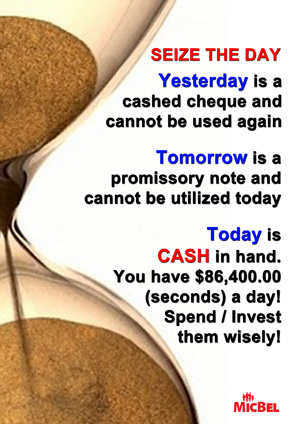A review of “The Richest Man in Babylon” with Robert Allen
The Richest Man in Babylon
Recently, Robert G.Allen during his Breakfast with Bob conversation with his listeners, was discussing about a classic book on personal financial thrift, which is “ The Richest Man in Babylon” by George S.Clason.
For me, listening to him talking about the book from his perspective was intriguing for me, for the word Babylon has negative connotations in the Bible for him. The words “ The Richest Man In Babylon ”, was almost like a kind of negative term. But why should he want to learn about the richest man in Babylon?
I would like to share what I learn from him during the call. Well, this is a parable and story of a wealthy man named, Akad, in the city of Babylon which was an extremely wealthy city, no doubt about that. The wonders of Babylon, the hanging gardens of Babylon. So it was famed for a time, and this story is obviously about a fictional tale about a very rich man in Babylon and how he became rich.
It starts off with the fellow who is a chariot maker who is complaining about his rotten life and his friend comes over to commiserate with him and they’re both talking about how one of their friends went to the same school that they went to and he ended up becoming the richest men in Babylon.
They decided they better go talk to him and find out why they are poor and he’s rich. So what Robert Allen noticed in reading the book this time round, was the questions that they were asking themselves about their own lives – or they’re complaining, which is one of the worst ways to get rich. He noticed that they’re asking themselves the wrong questions. Whenever they ask negative questions, they tend to get negative answers and therefore living lives of negative results.
To be honest, even though I have read this book many times, I never thought of it this way. You always have new insights and discoveries and I learned from the experience, that in order to live a successful life, depends very much on the quality of questions we asked ourselves on a daily basis.
In the beginning of the Richest Man in Babylon book, it talks about three fundamental principles of money management.
The first principle is you have to learn to live on less than what you earn. The way he says that is “ A part of all you earn is yours to keep”. Its about ” Paying Yourself First ” instead of paying others first and then paying yourself with whatever balance you have left from what you have earned for the month.
The question is, do you save some of your money every single week or month? Are you a saver or a spender ? Only when you save money and invest, you put money to work and as you save more money, you put more money to work for you and yet the money itself has its children – interest – and the children go to work and build more money. It is the habit of savings that its absolutely essential.
The second principle was, you have to learn to seek advice from those who are more competent through their own experiences to give it. Once again, most of us seek advice from our friends, people around us. And our friends, if they haven’t earned the right to advise us, then we have to be very careful about listening to their advice. When I shared this principle with my friends, I always asked them a question? If you are sick, do you ask your gardener for advise? Absolutely not. You seek the advise of a medical practitioner. Likewise, in the area of finance, you seek the advice of a financial expert to help you in your financial plans.
The third principle, you have to learn to make gold work you instead of you working for gold. Its about compounding and growing your money.
The way to illustrate the principle of compound interest is that you can take a dollar a day, you invest it, what happens to it?
You can put zero percent interest into it. A dollar a day, by the time you reach retirement age, 66, goes into about 25,000 dollars. A dollar a day invested at 3 percent interest goes into about 75,000 dollars. A dollar a day at 5 percent interest goes into just under 200,000 dollars. A dollar a day… and everyone can afford a dollar a day… a dollar a day at 20 percent interest grows into 2.75 million dollars. A dollar a day at 15 percent interest goes into 50 million dollars. A dollar a day at 20 percent internet grows in 1 billion dollars in a lifetime.
Then, having that foundation of compound interest, you’ve got to learn to value every dollar because every dollar is a money seed to grow into a money tree. It can grow into enormous amounts of wealth if you learn how to invest in it at the right rate and consistently over a long period of time.
So, the first few chapters of the Richest Man In Babylon are about how to acquire money, how to keep it, and how to use it. So these are fundamentals, the basics tenets of sound money management. Hope you enjoyed the sharing what I learned from my mentor, Robert Allen.
I hope you have enjoyed my sharing. To your success and financial abundance. ![]()
By Michael Tay www.michaeltay.com
Are You Ready? How Many Weekends Do You Have?
This is the 2nd quotation that I would like to share. I find it interesting and I have done a poster on it.
The actual size poster is in my facebook wall album
Time is a precious resource for all of us. We are all given the same amount of time each day but what we do with it will determine the results of our lives.
We are all given 24 hours every day. No matter who we are, each and every day, we are given the same 24 hours. We are all given the same exact amount of time. We all have the same 24 hours to get things done.
We cannot manage time. However, we can manage the activity that we do each day, so that we can get more time in a day to do what we enjoy most. Here are 4 ways to determine where you are losing your precious time, eliminate time wasters in your life, and setting up a strategy to free your time and doing things you truly enjoy.
1. Getting Rid of Time Wasters
In order to get most of our time, we need to get rid of time wasters. What are some of the time wasters activity. On an average, many people watches 4 hours of TV per day. Yes, we all deserve a break and unwind, but some of these 4 hours can be better utilize and spent elsewhere, learning and growing ourselves. TV, gossiping, playing computer games or surfing the internet have the tendency to take up more of our time than we had anticipated.
Find out where you time goes. Make sure your time is spent on productive useful activities that will help you develop and grow yourself to becoming a better person. Read the rest of this entry »









